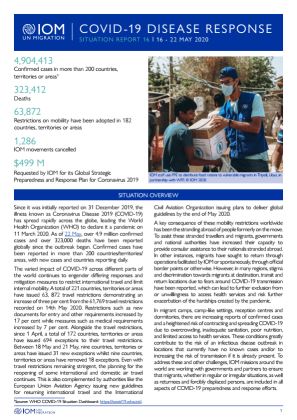-
Countries
-
Data and Analysis
-
Special Focus
-
Crisis Responses
IOM COVID 19 Response - Situation Report 16 (22 May 2020)

Contacto
COVID Response HQ covid19ops@iom.int
Idioma
English
Ubicación
Global
Fecha de instantánea
May 16 2020
May 22 2020
Actividad
- Other
- Points of Entry (PoE)
Since it was initially reported on 31 December 2019, the illness known as Coronavirus Disease 2019 (COVID-19) has spread rapidly across the globe, leading the World Health Organization (WHO) to declare it a pandemic on 11 March 2020. As of 22 May, over 4.9 million confirmed cases and over 323,000 deaths have been reported globally since the outbreak began. Confirmed cases have been reported in more than 200 countries/territories/ areas, with new cases and countries reporting daily. The varied impact of COVID-19 across different parts of the world continues to engender differing responses and mitigation measures to restrict international travel and limit internal mobility. A total of 221 countries, territories or areas have issued 63, 872 travel restrictions demonstrating an increase of three per cent from the 61,769 travel restrictions recorded on 14th May 2020. Restrictions such as new documents for entry and other requirements increased by 17 per cent while measures such as medical requirements increased by 7 per cent. Alongside the travel restrictions, since 1 April, a total of 172 countries, territories or areas have issued 694 exceptions to their travel restrictions. Between 18 May and 21 May, nine countries, territories or areas have issued 31 new exceptions whilst nine countries, territories or areas have removed 18 exceptions. Even with travel restrictions remaining stringent, the planning for the reopening of some international and domestic air travel continues. This is also complemented by authorities like the European Union Aviation Agency issuing new guidelines for resuming international travel and the International Civil Aviation Organization issuing plans to deliver global guidelines by the end of May 2020. A key consequence of these mobility restrictions worldwide has been the stranding abroad of people formerly on the move. To assist these stranded travellers and migrants, governments and national authorities have increased their capacity to provide consular assistance to their nationals stranded abroad. In other instances, migrants have sought to return through operations facilitated by IOM or spontaneously, through official border points or otherwise. However, in many regions, stigma and discrimination towards migrants at destination, transit and return locations due to fears around COVID-19 transmission have been reported, which can lead to further exclusion from or unwillingness to access health services and risk further exacerbation of the hardships created by the pandemic. In migrant camps, camp-like settings, reception centres and dormitories, there are increasing reports of confirmed cases and a heightened risk of contracting and spreading COVID-19 due to overcrowding, inadequate sanitation, poor nutrition, and limited access to health services. These conditions greatly contribute to the risk of an infectious disease outbreak in locations that currently have no known cases and/or to increasing the risk of transmission if it is already present. To address these and other challenges, IOM missions around the world are working with governments and partners to ensure that migrants, whether in regular or irregular situations, as well as returnees and forcibly displaced persons, are included in all aspects of COVID-19 preparedness and response efforts.
